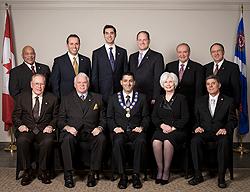By Paul Chislett
In his 2010 inaugural address, Mayor Eddie Francis said he hoped “City Council will act quickly to create Neighbourhood Advisory Councils [which will] bring City Hall, local residents, and businesses together to . . . meet neighbourhood needs.” Adding that he would not bend to special interest groups, Francis stated that “. . . for this to work . . . ideas must be consistent with our larger vision, . . . [be] focused, and deliver on two or three priorities that enhance our quality of life. . .” .
On the surface Neighbourhood Advisory Councils sound like a very good and necessary idea. However, in the context of a divided community highlighted by the city strike and the defeat of a citizen movement to allow urban chickens, a closer look is needed at what neighbourhood advisory councils can be.
One look at a photo of the present city council indicates that not all Windsorites are represented. Out of 10 councilors, eight are white males with professional backgrounds. This stands in stark contrast to the multicultural and working class reality of Windsor.

Photo: http://www.citywindsor.ca
In Windsor, representative democracy is failing to include many viewpoints and experiences, and this fact makes neighbourhood councils necessary. In a report entitled Respect All Voices: Neighbourhood Councils as a Tool for Building Social Inclusion, Glynis Maxwell reports that “…community members feel . . . their vote won’t make a difference to the outcome of [an] election and/or to the policy decisions made thereafter.” Maxwell indicates that neighbourhood councils, as a form of citizen engagement, should be seen as a “transformative process”; that is to say, a citizen process to liberate politics from what Daniel Schugurensky, a researcher with the Ontario Institute for Studies in Education (OISE), calls a “clientelistic” relationship which “disempowers and control[s] people” – that is to say people as passive accepters of services designed and delivered by others. Neighbourhood advisory councils can enable people to engage in the democratic process on an ongoing basis, not just when election time rolls around.
Windsor’s municipal government can be described as a technocracy peopled by a professional class with an agenda of further economic growth which enriches other members of the same class. Municipalities are generally in the hands of developers and city professionals, and our elected representatives serve those interests. It is a democracy of a kind, but exclusionary, lacking humility, and generally derisive of citizen involvement. Before these councils are formed, citizens need to define their roles in these councils before it is done for them. Even the definitions of what constitutes a neighbourhood and citizen need to be agreed upon , according to Maxwell.
Maxwell points out that neighbourhood councils have a confusion of names and purposes and that there “…is no commonly agreed definition of any of these terms.” Windsorites, therefore, have the ability to define for themselves the framework for the councils. The most important elements, according to Maxwell, are that the councils be “neighbourhood based”, be “formed with the support of, and have a formal relationship with, municipal government”, and “formed for the purpose of building social inclusion and civic engagement” , the latter of which is arguably the most key. As well, they should not be confused with other committees or advisory boards that simply give input to decision-makers. Maxwell stresses that city officials must learn to have confidence in “neighbourhood intelligence” , something that seemed absent during the debate on urban chickens. Yonn Dierwechter and Brian Coffey, in their study of Tacoma, Washington neighbourhood councils, investigated whether neighbourhood councils evolved as “political spaces” able to challenge and transform development agendas or if they were merely useful political tools – “segmented spaces” – keeping activists busy and powerless. They found that Tacoma’s neighbourhood councils had yet to reach their potential as political spaces and struggle to avoid being co-opted by the city .
Schurgurensky takes the approach that education is a transformative function, and that we must learn to be empowered citizens, a process neighbourhood councils can play an important role in shaping. Schurgurensky points out that there is an “urgent need” for citizens to begin the learning process of empowerment by doing it. That we learn by doing is a key concept in adult education; and therefore, neighbourhood councils are crucial for citizenship development and decision-making. Schurgurensky adds that “…learning . . . acquired through participation … often has an expansive effect”, leading to greater interest and participation beyond local issues. The expansive effect . . . allows “. . . the transition from narrow self-interest to the common good, and . . . to a more comprehensive understanding of the community as a whole.” Citizen solidarity, therefore, has the capacity to transform the way we do politics.
Mayor Francis already views citizens as merely taxpayers and has warned against special interest groups – a convenient phrase to denigrate those outside the established order. This does not bode well for neighbourhood councils in Windsor. Maxwell points out that city councils and staff should avoid viewing citizens as “consumer[s] of services (the taxpayer approach)”, but rather as “. . . urban citizen[s] with a vital role to play in governance. . . “ . Neighbourhood councils, by transcending the traditional top down model of politics, should be able to challenge authority, be agenda setters, and build solidarity among citizens to overcome barriers of privilege. The expansive factor can also influence provincial and federal politics.
( A version of this article appears in the April issue of Windsor’s The Scoop)

 Photo: Paul Chislett
Photo: Paul Chislett